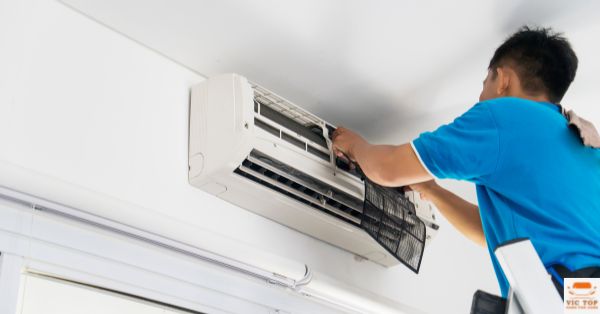Taking advantage of the square footage in a windowless garage is challenging during the summer or winter because it lacks ventilation. Whether you want to store equipment, tools, volatile organic compounds or park your vehicle, maintaining reasonable temperatures is critical. Hence, you need to get the best air conditioner for a garage with no windows to ensure you can help you turn the space into a workshop or ensure your vehicle does not rust.
Are Windowless Garage Air Conditioners Necessary?
If you have a workstation in a windowless garage, working on your projects during the summer or winter can be a nightmare. The place can either be uncomfortably hot or unbearably cold, making it difficult to concentrate as you sweat or shiver. If you do not spend much time in the space, finding an ac unit may not rank high on your priority list.
Nevertheless, using your garage as a storage area for your garden equipment, general tools, paints and solvents, controlling the temperature is beneficial. For instance, high heat can reduce the longevity of the things stored there. In addition, extreme temperatures can cause the compoundsto separate and become unusable while creating a rancid smell.
Moreover, temperature extremes in a windowless garage go hand-in-hand with humidity issues. Storing your vehicle in such an environment could mean pricey repairs and a shorter lifespan for your car. Plus, high humidity negatively affects your paint job and interior trimmings and makes the upholstery emit a moldy smell.
Admittedly, most garages do not allow rain to enter the interior, but a lack of windows means any moisture cannot escape. Air conditioners can help ensure your garage is safe from environmental factors that threaten to degrade the things stored inside. So, what options do you have for ac units or cooling?
Types of Air Conditioners
a). Evaporative Cooler
When water evaporates, turning from liquid to vapor requires energy. Since it takes in energy from its immediate environment, the area cools down. This principle applies to the skin as you sweat on a hot day as a way for your body to lower its temperature.
Evaporative coolers have an evaporative pad, a fan, a water distributor and a reservoir. The pad has a large surface area where water molecules can evaporate from, despite fitting in a compact space. This part of the cooler gets the water from the distributor while a reservoir awaits any excess.
The fan draws in hot air from the environment and pushes it through the pad, where it loses its heat energy to the vapourising moisture. On the other side, you get cool air and a more humid environment. Since evaporative coolers add moisture to the air, they work best in arid areas with dry, hot air.
The simple design of the evaporative cooler ensures low running costs. In addition, some models include air filters, but you may not be able to tweak the cooling effect to get a specific temperature. Increasing humidity, especially in a windowless garage, may eventually cause rusting and mold issues on walls, tools and equipment.
b). Portable Air Conditioner
Portable air conditioners are the best option for creating a cooling environment when chilling in the living room, working in your garage or sleeping at night. The advantage of wheeling them around is you do not have to invest in more expensive and permanent AC units. Also, they make sense for a garage with no windows.
Unfortunately, you need to ensure that the hot air the AC pulls from the air goes somewhere other than back into the room you are trying to cool. Consequently, some portable air conditioners feature dual hose construction where one duct carries hot air outside through a window or vent through the wall. So you need adequate venting for them to be effective. You can create a permanent vent beneath or above your garage door if you do not have windows.
c). Window Air Conditioner
Window air conditioners do not require significant home modifications to install as you only put them on top of a window. Nevertheless, the size of the window matters as smaller or larger ones may make setting them up tricky. Plus, this air conditioner is not an option if your garage lacks windows.
Still, window air conditioners are pretty popular because of their power and affordability. In addition, these units can be energy efficient and feature smart features such as internet connectivity. Hence, you can tweak the settings of your window air conditioners while in the office and have the house ready for you when you get home.
d). Wall-Mounted Air Conditioners (Ductless/Mini-Split Air Conditioners)
The mini-split air conditioners are more energy-efficient than the window and portable air conditioners. The models feature two parts where you get one wall-mounted unit for indoor installation, and an outside unit (condenser) releases hot air and moisture from inside through the conduit. Ideally, you can have several indoor units guiding the humid hot air to the outside via the refrigeration piping.
Consequently, you do not require windows for the garage air conditioner to work. As mini-split systems produce cool air, the associated piping dispenses the moisture and warmth without blowing it outside. Their energy efficiency and relative ease of installation make them a fantastic, albeit expensive, alternative to a window air conditioner.
e). A Fan
The best garage air conditioners may be fans if you want a quick, cheap and simple solution to the hot summer days in a windowless room. Like a portable AC, no installation is required, and you can also wheel it into any room you want to cool. In addition, you can point it towards you if you are sitting on your workstation and target a particular space within the room.
Unfortunately, like some evaporative coolers, fans lack precision in their functionality. Thus, you cannot achieve a specific temperature. Still, a gentle breeze hitting your face will always have a cooling effect.
Choosing the Best AC Unit for your Garage
a). Garage Size and Cooling Capacity of Air Conditioner
Size matters, especially when finding the right cooling or heating solution for your spaces. Air conditioners come with BTU ratings that determine the volume they can effectively cool or heat. Buying a smaller model in hopes of making savings could mean waiting longer to achieve the desired temperature.
Comparing BTU figures can be especially confusing when you do not understand what they mean and how they factor into the results. However, the higher the rating, the larger the air volume the garage air conditioner can affect. So, take measurements of your indoor space (length, width and height) to determine the volume before buying a unit.
Luckily, you can find size charts online to help you make the right decision. However, there are two units you need to consider when it comes to BTU ratings.
b). Running Costs (Power and Maintenance)
Energy use is a critical factor in buying garage air conditioners. For instance, portable systems tend to be more power-hungry than mini-split ones. In addition, a small-sized air conditioner will have to run for extended periods to cool a garage space larger than the recommended volume. Hence, you will have higher electricity bills.
Furthermore, two ratings indicate how energy-efficient garage air conditioners are and the associated running costs. First, the EER (Energy Efficiency Rating) compares your air conditioner to the temperature outside while including the BTUs and power consumption. Secondly, the SEER (Seasonal Energy Efficiency Ratio) takes the previous factors but compares them to a cooling season instead of the outside temperature.
A high EER means low running costs, but these air conditioners are pretty expensive. In addition, you should prioritize SEER over EER if you live in a moderate climate where the temperature fluctuates.
Unless you are using evaporative coolers or fans, most air conditioners require you to deal with the moisture they collect while operating. Typically, you will need to drain it to prevent water pooling close to the unit. Maintenance can be tasking if you lack proper drainage of the extracted humidity.
Ensure you go for a garage air conditioner with washable air filters. In addition, ones that come with indicators to let you know when to clean the filters can reduce the stress of maintaining the models. After all, improving the air quality should not overwhelm you.
c). Quiet Operation
Closing your garage door to get peace while working may not be effective if your air conditioner is noisy. Some units are more silent than others. For instance, mini-split air conditioners are pretty silent compared to portable ones. Depending on the speed rating, fans can be quite loud.
d). Balancing Between Insulating and Ventilating
Proper insulation is vital whether you are installing through-the-wall air conditioners or portable ones with a hose leading to the outside. It will ensure that the cool air does not escape to the outside leading to ineffective cooling. Additionally, warm air should not find a way to your space via the garage door. After all, not plugging these holes will mean that your unit will have to work overtime to attain your desired temperature.
Similarly, ventilation is critical to get an efficient way for the cold and warm air to circulate into and out of your garage. A simple fan or an evaporative cooler will not be ideal for windowless spaces as airflow is nonexistent. However, drilling holes by buying units that have ventilative features will help reduce your running costs.
We at VIC Top Cash For Cars, Always Ready to Assist You. Anytime. Everywhere. Any Day.
Our Services,
- Car Removal
- Cash For Cars
- Unwanted Car Removal Melbourne
- Cash For Scrap Car Removal Melbourne
- Old Car Removal Melbourne
If you are in Seaford, Victoria 3198 and looking for VIC Top Cash For Cars, below is the best way to visit us.
Contact us
VIC Top Cash For Cars,
2 Rochford Pl,
Narre Warren South VIC 3805
(03) 7035 7828
info@victopcashforcars.com.au


Recent Comments